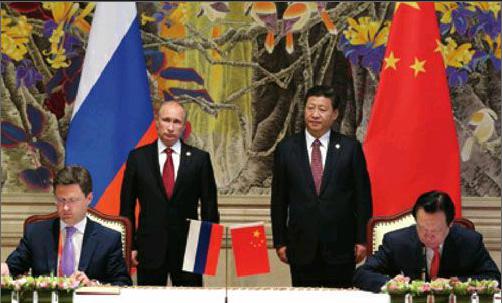A Historic Deal
2014-06-17ByDingYing
By+Ding+Ying

Chinese and Russian leaders have proclaimed to the world that their relationship is at a high point. The two major neighboring powers have now illustrated this claim by expanding ties in the fields of energy and security.
Chinese President Xi Jinping and his Russian counterpart Vladimir Putin jointly released a statement on May 20 during the latters first state visit to China since Chinas leadership transition in March 2013. Both showed eagerness to bring bilateral relations into a new phase wherein the two countries economic and security cooperation will become as close as their political relationship.
Pipeline partners
In the joint statement, the two sides pledged to promote cooperation not only in a bilateral way, but also in multiple regional platforms, creating a detailed blueprint for their practical cooperation. China and Russia also signed dozens of cooperative agreements during Putins two-day state visit during the Fourth Summit of the Conference on Interaction and Confidence Building Measures in Asia (CICA) in Shanghai.
“China is our reliable friend. To expand cooperation with China is undoubtedly Russias diplomatic priority,” Putin said to the Chinese press on May 20 before attending the CICA Summit. The Russian president said he believed that it was of crucial significance for the two countries to strengthen mutually beneficial economic and trade relations and boost mutual investment, claiming it is the way forward against the backdrop of global economic turbulence.
In the joint statement, they set a target of increasing their trade volume to$100 billion by 2015 and to$200 billion by 2020. China is currently Russias largest trading partner, with the trade volume between the two countries nearing $90 billion in 2013. Moreover, the two sides are on their way to implementing 40 major projects worth $20 billion.
As a major step of expanding economic cooperation, China and Russia inked a long-awaited natural gas deal in Shanghai on May 21, finalizing a negotiation process that has lasted over two decades. Xi and Putin witnessed the signing of two related documents—China and Russia Purchase and Sales Contract on East Route Gas Project and a memorandum.
According to the contract signed by the China National Petroleum Corp. (CNPC) and Russias Gazprom, the east route pipeline will provide China with 38 billion cubic meters of natural gas annually from 2018. The gas will come from the Kovyktin and Chayandin gas fields in eastern Siberia and will be piped to Chinas northeast, the Beijing-TianjinHebei metropolitan area in the north and the Yangtze River Delta in the east. Some media reported that the contract could be worth as much as $456 billion.

Observers considered the gas deal a landmark in the growing ties between the two countries.
“The deal has cemented a very steady basis for bilateral cooperation,” said Qu Xing, President of the China Institute of International Studies (CIIS). He noted that it will help China to diversify its energy import sources, while extending Russias export markets.
Qu believes that the deal is a natural result of the continuing development in Russias political and economic demands. Politically, Russia needs to find a reliable partner after decades of tussling with Europe and the United States. Economically, it has to find a big and stable market like China to counterbalance sanctions on importing Russian oil and gas from the West due to the Ukrainian crisis, he added.
According to statistics from the CNPC, natural gas consumption in China reached 167.6 billion cubic meters in 2013, up 13.9 percent year on year, and the annual growth rate is estimated to be 10 percent in the next few years due to the countrys need for clean energy to tackle air pollution and pursue sustainable development. The gas deal with Russia will satisfy Chinas energy demands.
Professor Yang Chuang of the China Foreign Affairs University said bilateral cooperation in natural gas is a project of long-term strategic significance. The cooperation meets the two countries common interests, said Yang, and will drive bilateral cooperation in other fields.
Security ties
Another highlight of Putins state visit to China had to do with bilateral security cooperation, as Beijing and Moscow promoted military mutual trust. China and Russia began joint naval drills in the East China Sea off Shanghai on May 20, with presidents of the two countries attending the launch of the naval exercise.
The rehearsal demonstrated the new level of strategic mutual trust and coordi- nation between the two countries, said Xi, stressing the joint exercise would showcase the two sides resolve in responding to threats and challenges as well as safeguarding regional security and stability. Putin agreed that closer military ties are an important part of the bilateral comprehensive strategic partnership.
A total of 14 vessels, two submarines, nine fixed-wing aircraft as well as helicopters and Special Forces took part in the weeklong“Joint Sea-2014” exercise. Both China and Russia dispatched ships, including Chinas Zhengzhou and Ningbo missile destroyers and Russias Varyag missile cruiser. This was the third China-Russia joint naval exercise after joint drills off the coast of Russias Far East in July 2013 and the Yellow Sea in April 2012.
“This is a clear show of enhanced mutual trust between the two militaries, and of increased transparency,”said Li Shuyin, a research fellow with the Academy of Military Sciences of the Chinese Peoples Liberation Army. He added that the exercise also highlighted that the strategic partnership between Beijing and Moscow has reached a new high.
All Chinese and Russian vessels were merged into three different groups, and commanded by both Chinese and Russian commanders so as to enhance coordination between the two navies. The exercise simulated anchorage defense, maritime assaults, anti-submarine combat, air defense as well as identification, rescue and escort missions.
China and Russia also decided to jointly celebrate the 70th anniversary of the defeat of the Nazis in 2015.
China and Russia are unanimous in opposing attempts to distort the World War II record, said Putin, who stressed those attempts are unacceptable and the consequences are dangerous.
According to Putin, China and Russia have been actively advocating the creation of a new security and sustainable development framework in the Asia-Pacific region, which is based on principles such as equality, abiding by international laws, and non-use or nonthreatening use of violence.
“High-level mutual trust is a key trait in bilateral ties as it facilitates the two sidesmutually beneficial cooperation in a variety of spheres, including regional security and stability,” said Qu of the CIIS. He concluded that by building a relationship based on equality, trust, mutual support, common prosperity and longlasting friendship, China and Russia are building an example of relations between major countries across the world.
